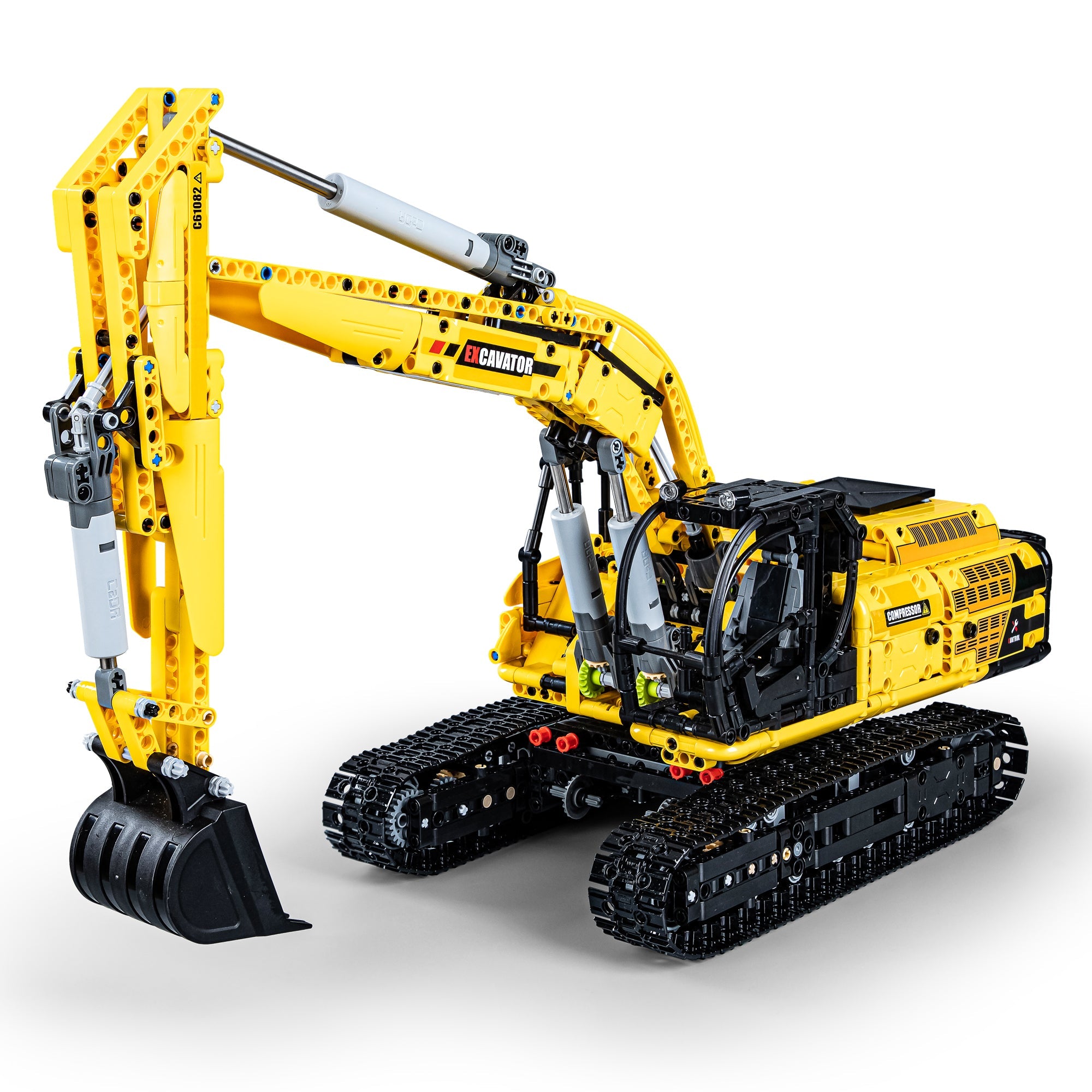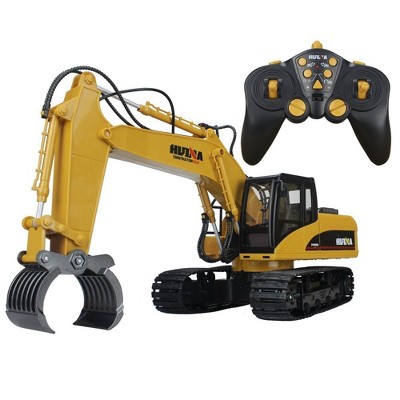What Are the Best Attachments for a rc excavator? A Comprehensive Guide
Discover the Relevance of Excavator in Modern Building And Construction Projects
Excavators are essential tools in contemporary construction tasks. Their adaptability allows them to execute a wide range of jobs, from excavating and grading to demolition and website prep work. Advanced functions, such as hydraulic accessories and general practitioners, boost their capabilities and efficiency on work websites. As the sector evolves, the importance of excavators grows a lot more. Understanding their duty can reveal insights right into the future of construction practices. What lies ahead for these devices?
The Flexibility of Excavators in Different Projects
Excavators are frequently linked with large-scale construction projects, their convenience enables them to be made use of in a broad array of applications, from property landscape design to energy maintenance. In metropolitan settings, excavators can navigate tight areas to dig structures for homes or set up drain systems. Their ability to perform delicate tasks makes them optimal for landscape design tasks, where they can dig deep into for ponds or plant trees. In addition, excavators play a crucial function in utility maintenance, effectively excavating trenches for pipelines or cables without interrupting bordering locations. In agricultural applications, they help in land clearing and dirt preparation. Their flexibility allows them to be furnished with numerous attachments, improving their performance throughout different jobs. This diverse nature of excavators not just simplifies different building and construction procedures but also shows their important duty in modern framework advancement and upkeep.
Trick Attributes and Kinds Of Excavators
The discussion on essential attributes and types of excavators highlights the necessary qualities that make these equipments vital in building and construction. Different excavator kinds, each designed for particular jobs, demonstrate their convenience and efficiency across different applications. rc excavator. Recognizing these classifications and features is crucial for optimizing their use in modern-day construction tasks
Excavator Enters Review
Excavators play a critical role in modern building and construction, supplying flexibility and effectiveness throughout different tasks. These hefty machinery systems been available in numerous types, each customized for certain applications. One of the most typical types consist of spider excavators, understood for their stability on uneven surface, and wheeled excavators, which give better movement on paved surfaces. Mini excavators are preferred for small-scale jobs and tight spaces, while long-reach excavators are developed for deep digging. Additionally, there are specialized excavators, such as hydraulic excavators, which boost power and precision. Each kind features special capacities, making them vital for tasks varying from excavating and grading to demolition and product handling. Understanding these variants permits building and construction experts to choose the ideal excavator for their job requires.
Secret Includes Explained
Comprehending the crucial functions of excavators boosts their efficient application in construction jobs. Excavators are identified by their powerful hydraulic systems, which offer the essential force for excavating, training, and relocating materials. Their expressed arms permit a vast array of motion, assisting in exact procedures in constrained areas. Additionally, the range of attachments, such as pails, grapples, and augers, broadens their adaptability to meet different task requirements. The size and weight of excavators also add to their stability and maneuverability on various terrains. Advancements in innovation have led to the assimilation of GPS and automation, improving accuracy and performance in excavation tasks. These features collectively position excavators as important devices in modern-day building.
Applications in Building and construction
Transforming building sites, excavators play an essential function across various applications, varying from property structure projects to massive framework growths. These flexible equipments are equipped for tasks such as excavating structures, trenching for utilities, and site grading. Various kinds of excavators, including spider, rolled, and mini excavators, supply specific benefits tailored to the project demands. Crawler excavators master rough terrains, while rolled excavators offer wheelchair on paved surface areas. Mini excavators are excellent for confined areas, making them preferred in urban setups. The performance and power of excavators considerably quicken building procedures, ensuring timely job conclusion. Their adaptability better improves their significance, permitting building and construction teams to tackle a diverse range of challenges efficiently.
Enhancing Efficiency and Efficiency on Task Sites
Optimizing performance and productivity on work sites is an important objective in modern-day construction. Excavators play a crucial function in achieving this objective by enhancing different tasks. Their ability to perform multiple features-- such as grading, training, and excavating-- minimizes the need for extra tools, consequently saving time and resources.Moreover, excavators boost workflow by enabling faster completion of jobs. With advanced features like hydraulic add-ons and GPS modern technology, they can perform accurate procedures that reduce mistakes and revamp. This precision not only boosts the high quality of work but likewise optimizes material use, adding to set you back savings.The flexibility of excavators enables them to adapt to various website conditions, ensuring that jobs advance smoothly no matter obstacles. By incorporating excavators into construction procedures, groups can substantially enhance their total efficiency, causing timely task conclusion and enhanced productivity.
Security Benefits of Utilizing Excavators
Excavators considerably enhance security on building and construction websites through improved driver visibility and minimized manual labor threats. By supplying operators with a clear sight of their environments, excavators aid to avoid mishaps and injuries. Additionally, the equipment decreases the need for workers to engage in harmful hands-on tasks, better promoting a safer job atmosphere.
Improved Operator Presence
Building and construction websites can be disorderly and filled up with possible threats, improved operator visibility plays a vital role in making sure security when using excavators. Modern excavators are made with large, unblocked windows and purposefully placed mirrors, allowing operators to keep a clear sight of their environments (rc excavator). This boosted presence is critical for detecting pedestrians, various other machinery, and various obstacles, considerably reducing the danger of mishaps. In addition, several excavators include innovative modern technology, such as sensors and video cameras, to supply drivers with additional point of views, additionally enhancing recognition. The capability to see more plainly not just aids in effective operation but additionally promotes a more secure job environment, making it less complicated for drivers to navigate complex building and construction sites without endangering safety and security requirements
Minimized Guidebook Labor Threats
When manual work is decreased via the use of excavators, many safety and security benefits arise, markedly improving the health of building employees. Excavators decrease the physical strain connected with heavy training and repetitive jobs, efficiently decreasing the risk of musculoskeletal injuries. By automating processes such as digging, grading, and relocating products, they permit employees to maintain a much safer range from potential dangers. Additionally, excavators are equipped with sophisticated safety and security features, such as rollover security systems and boosted operator ergonomics, which better protect employees on site. The outcome is a substantial reduction in work environment crashes and injuries, causing increased efficiency and morale among building and construction groups. Ultimately, the adoption of excavators adds to a much safer and a lot more efficient building environment.
Excavators in Earthmoving and Website Preparation
In modern-day building and construction, a substantial section of earthmoving and website prep work tasks depends on the performance and versatility of Go Here excavators. These devices are created to handle different soil types and terrain, making them essential for grading, excavating, and trenching tasks. Their hydraulic arms can be furnished with various accessories, such as augers and pails, permitting operators to tailor their technique based upon certain task requirements.Excavators succeed at relocating huge volumes of earth promptly and efficiently, which speeds up the general building timeline. They can browse limited areas and testing sites where traditional equipment might have a hard time, boosting productivity. In addition, the accuracy of excavators warranties that website preparation adheres to rigorous specifications, minimizing the danger of errors that can result in pricey rework.
The Function of Excavators in Demolition Tasks
Excavators play a vital role in demolition tasks, as they have the power and agility required to dismantle frameworks efficiently. Equipped with different attachments such as hydraulic breakers, shears, and grapples, these equipments can adjust to various find out this here demolition demands, whether for tiny buildings or huge commercial websites. Their adaptability allows drivers to take on complicated projects while keeping safety and precision.In addition to their demolition capabilities, excavators help with particles removal, ensuring that job sites stay well organized and safe. By damaging down frameworks into manageable pieces, they enable streamlined cleaning and recycling of products, straightening with modern sustainability efforts.Moreover, excavators can access tight rooms and browse irregular surface, making them essential in metropolitan demolition tasks. Generally, their durable design and multifunctionality make excavators an essential property in the demolition stage of construction, adding substantially to project timelines and efficiency.


Future Trends in Excavator Innovation and Use
As the construction sector develops, advancements in excavator modern technology are positioned to change their usage and performance markedly. One substantial fad is the combination of automation and expert system, permitting excavators to operate with minimal human intervention. This change will improve precision in jobs such as grading and trenching, lowering human mistake and boosting productivity.Additionally, the increase of electric and hybrid excavators is forming a much more sustainable building environment, decreasing carbon exhausts and gas expenses. Enhanced telematics systems are also emerging, enabling real-time surveillance of maker performance and maintenance demands, which can bring about much better operational performance and longer tools lifespan.Moreover, improvements in accessory technology are broadening the versatility of excavators, enabling them to carry out a more comprehensive variety of jobs. The combination of these patterns demonstrates a future where excavators are smarter, greener, and a lot more adaptable, eventually improving building and construction project dynamics.
Regularly Asked Concerns
How Do Excavators Contrast to Other Construction Equipment?
Excavators, identified by their versatility and power, stand out in excavating and earthmoving contrasted to other machinery. Their capability to carry out different tasks, including lifting and demolition, makes them vital in building jobs, boosting total efficiency.

What Is the Average Life-span of an Excavator?
The average life expectancy of an excavator normally ranges from 7,000 to 10,000 operating hours, depending on upkeep, usage problems, and design. Proper treatment can prolong this life-span, guaranteeing peak performance throughout its operational years.
How Are Excavators Maintained for Ideal Performance?
Excavators require routine maintenance for peak performance, including routine examinations, fluid checks, filter replacements, and timely fixings. Carrying out a preventive upkeep routine helps lengthen their lifespan and assurances effective operation in various building atmospheres.
What Are the Prices Connected With Renting vs. Buying an Excavator?
The prices associated with leasing versus getting an excavator vary considerably. Renting offers lower upfront expenditures however can build up over time, while buying needs a substantial first financial investment, however offers long-lasting savings and property ownership advantages.
What Training Is Called For to Operate an Excavator?
Running an excavator needs specialized training, commonly consisting of security protocols, equipment procedure methods, and environmental recognition. Qualification programs often mandate practical experience, making it possible for operators to handle numerous tasks efficiently while ensuring compliance with market laws. The most usual types include spider excavators, understood for their stability on uneven terrain, and rolled excavators, which supply greater mobility on paved surfaces. Small excavators are favored for small-scale projects and limited rooms, while long-reach excavators are designed for deep excavating. Additionally, there are specialized excavators, such as hydraulic excavators, which boost power and accuracy. Various kinds of excavators, including crawler, wheeled, useful reference and mini excavators, give details benefits tailored to the job requirements. Crawler excavators stand out in harsh terrains, while wheeled excavators offer flexibility on smooth surface areas.